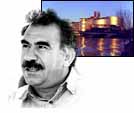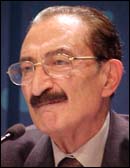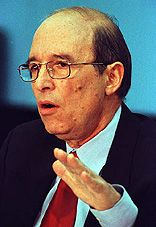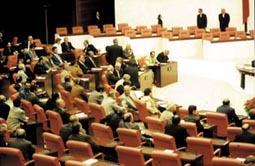26
September 2002
![]()
2. "Court acquits 32 suspects demanding Kurdish courses", some 32 imprisoned suspects accused of aiding and abetting the members of the outlawed Kurdistan Workers' Party (PKK) by demanding classes in the Kurdish language were acquitted on Wednesday.
3. "Council of Europe sends letter to Turkey for the application of ECHR decisions", Council of Europe Secretary General Walter Schwimmer sent a letter to Foreign Minister Sukru Sina Gurel calling Turkey to abide by the European Court of Human Rights (ECHR) decisions.
4. "Turkey Could Play Key Role on Attack of Iraq", Turkey is a key strategic and political ally in the U.S.-led war on terrorism, and is expected to play a key role in any military action against Iraq. But the prospect of war against Iraq raises serious concerns in the Turkish government, which has repeatedly appealed to the United States to reconsider its plans.
5. "Ecevit: Turkey won't be bystander in event of separate Kurdish state", Turkish Prime Minister Bulent Ecevit warned on Wednesday that his country would not stand by and watch the creation of a separate Kurdish state in northern Iraq, a region which borders Turkey.
6. "Greek parliament speaker accuses Turkey of attempting to blackmail EU", Greece's parliament speaker on Wednesday accused neighboring Turkey of attempting to blackmail the European Union ( news - web sites) by threatening to annex northern Cyprus if the island joins the bloc before it is reunited.
7. "Northern Iraq Kurds Agree on Draft Constitution", Northern Iraq's two main Kurdish factions, who run the enclave beyond Baghdad's control, have agreed on a draft constitution in the event a U.S. attack ousts President Saddam Hussein, a Kurdish official said on Wednesday.
8. "Turkish women furious as another "macho" parliament looms", Turkish women organizations are up in arms as only about 20 women stand a chance of being elected to parliament in the November general elections. "The situation regarding women's representation in parliament is sad. Politics is viewed totally as a man's business," Meltem Gevrek, who heads KA-DER, a support group for women candidates, told AFP.
1. - Kurdish Observer - "A historical case, a historical mission":
26 September 2002
Stressing on the historical importance of the Ocalan case in EHRC
on September 28 for the development of peace and democracy, Osman Ocalan,
member of PKK Council of Leaders called on the Kurdish people and the
Turkish administrators to approach it with a similar consciousness and
action.
Underscoring that the case in European Human Rights Court (EHRC) on September 28 will develop on the line of defending peace and democracy, Osman Ocalan, member of PKK (Kurdistan Workers’ Party) Council of Leaders, called on the Kurdish people to raise the struggle, and Turkish administrators to approach the opportunity for solution with common sense.
As the date of the Ocalan case in EHRC comes close, participated by telephone in the “Gundem” (Agenda) program on MEDYA TV with writers of our newspaper Irfan Cure and I. Metin Aycicek as studio guests on the program, Osman Ocalan made statement on the subject. Ocalan called attention to the meaning and importance of the EHRC case being held at a point in time at which a world war is on the agenda.
Pointing out that the case would develop as a defence of peace and democracy, Ocalan continued to say the following: “Defence statement of our Party Leadership is a manifest for peace and democracy. In this case struggle of our people for peace and democracy will be brought up. The answer of us, our people and all democratic forces will be put forth in this case. The case will be a platform on which the third line, that is the line for peace and democracy is attributed to all humanity.”
Call to the Kurdish people
The Kurdish leader called on all Kurds living in Turkey and abroad and their fellow peoples to raise the struggle for peace and democracy. Ocalan continued to say the following: “The history gave us a heavy but honorful mission. The Kurdish people should display the role of our leadership in EHRC. They should raise voice without any violence. They should go out day and night. If this is not given permission, they should develop their activities without exceeding the democratic limits. Kurdish youth in particular will be affected by a possible war. Our approach to the case in EHRC is like this.”
“God forbid!”
Calling out to the Turkish administrators, Ocalan said “Do not mention the word ‘war’, if you are nationalists, you will not enter into the war.” Ocalan emphasized that the hand held out for peace and democracy by PKK President should be grabbed by the Turkish rulers, adding, “they say that we will execute the capital punishment if we have the opportunity. you should not forget that if you execute, there will be unbelievable things occur. God forbid, we do not want even think about it.”
Interest of Turkey
Warning insistently that Turkey should not provoke and offend the Kurdish people in the person of PKK President, Ocalan had to say the following: “Our call to all administrators of Turkey, democratic groups, human rights associations and most ordinary citizens. We say: Come and we will make the Turkey a peaceful, a democratic country. We do not want condemn the Turkey, we will show its faults. And Turkey in turn should not attempt to condemn us. If exist, it should also show our faults. Let’s make effort together. It is in the interest of Turkey.”
Freedom for Ocalan
Osman Ocalan added that Turkey should take steps towards
freedom of Abdullah Ocalan for the sake of interest and future of the
state and peoples. ![]()
2. - Turkish Daily News - "Court acquits 32 suspects demanding Kurdish courses":
ANKARA / 26 September 2002
Some 32 imprisoned suspects accused of aiding and abetting the members
of the outlawed Kurdistan Workers' Party (PKK) by demanding classes
in the Kurdish language were acquitted on Wednesday.
The acquittals came few days after a regulation that allows the education of different languages and dialects was published in the Official Gazette and went into effect, thus paving the way for Kurdish-language courses.
Public prosecutor Cengiz Koksal said that suspects who filed a petition to the Interior Ministry, demanding Kurdish courses, were not involved in activities aiming at separating or challenging the state and supporting the terror organization.
Turkey passed rights reforms that include lifting the ban on Kurdish-language education and broadcasting, a step required by the European Union for Turkey to begin membership talks.
The EU had sharply criticized the detention of hundreds of students earlier this year who had held protests or signed petitions calling for Kurdish education.
Being part of a series of EU reforms, the regulation introduces the process pertaining to the private courses that will be opened for teaching of different languages and dialects.
According to the regulations, those who will be employed as teachers in these private courses are required to be Turkish citizens and be at least an elementary school graduate. These personnel should not have been convicted of crimes committed against the state in the past.
Turkish citizens and elementary school graduates, who are at the age of consent, can apply to these private courses to learn languages other than Turkish. Those who are below the age of consent, may continue these courses with the written permission of their parents.
As the EU is closely watching the practice of these reforms, the regulation is a significant step in terms of expanding rights and freedoms. Parliament had passed a series of reforms in the beginning of August including education and broadcasting in Kurdish.
Turkey had banned Kurdish education for years, fearing it might fuel violent separatism in the mainly Kurdish southeast and lead to division of the country.
More than 30,000 people have been killed since 1984, when
the PKK first took up arms for Kurdish self-rule in the southeast. The
fighting has died down since Turkey captured the PKK chieftain Abdullah
Ocalan in 1999. ![]()
3. - Turkish Daily News - "Council of Europe sends letter to Turkey for the application of ECHR decisions":
ANKARA / 26 September 2002
Council of Europe Secretary General Walter Schwimmer sent a letter
to Foreign Minister Sukru Sina Gurel calling Turkey to abide by the
European Court of Human Rights (ECHR) decisions.
Schwimmer in his letter also called Turkey to make more effort to apply the ECHR decisions. Schwimmer saying that he welcomed the EU reforms in Turkey, besides this demanded that Turkey take "bolder steps".
Council of Europe Parliamentarian Assembly in a recommendation decision taken yesterday, gave examples of ECHR decisions which were not applied by Turkey and called on Turkey to apply these decisions immediately.
Especially the application of the ECHR decision regarding
the retrial of Leyla Zana was demanded in the recommendation decision.
In the case of not applying the decision, it had been also declared
that the issue would be held again in the April 2003 session of the
Council of Europe Parliamentarian Assembly. ![]()
4. - VoA - "Turkey Could Play Key Role on Attack of Iraq":
ANKARA / 26 September 2002 / by Amberin Zaman
Turkey is a key strategic and political ally in the U.S.-led war
on terrorism, and is expected to play a key role in any military action
against Iraq. But the prospect of war against Iraq raises serious concerns
in the Turkish government, which has repeatedly appealed to the United
States to reconsider its plans.
During the previous Gulf War, Turkey, NATO's only Muslim member, opened its bases to Allied jets mounting bombing raids against Iraqi targets. It also closed a pipeline to loading terminals in southern Turkey through which some 70 percent of Iraqi oil was exported before the war. But in 1991 the goal was the liberation of Kuwait, not the overthrow of Saddam Hussein. That prospect has Turkey concerned.
Turkey fears that the fall of Saddam Hussein would create a power vacuum, and an opportunity for the Kurds of northern Iraq to move to establish an independent state. Turkey says an independent Kurdish state would re-ignite separatist sentiment among its own restive Kurdish population, particularly in eastern Turkey alongside the Iraqi Kurdish enclave. Turkish military leaders have even publicly threatened to intervene should the Iraqi Kurds make any moves towards breaking away from Iraq.
Concern about the Kurds is one point on which Turkey and Iraq agree. Leaders in Baghdad, like senior Ba'ath party official Abdurrazak Al-Hashimi, are pressing Turkey not to take part in any attack, saying the impact could be just as negative for Turkey as it would be for Iraq. "We hope that Turkey will not facilitate and will not participate in any kind of military action against Iraq not only for the interests of Iraq only but also for the main interests of Turkey," he says.
Kurdish officials say their goal is not the dismemberment of Iraq, but only what they call autonomy in a federal system. But Safeen Dizayee, the Ankara representative of the Kurdistan Democratic Party, which controls the western part of the Kurdish safe haven, says they will settle for nothing less. "The Kurdish parliament in 1992 has voted unanimously for a federal formula to resolve the Kurdish problem in Iraq and this is the maximum demand that the Kurds have to have a settlement in present or future Iraq," he says.
Turkish officials are opposed to even that. They say any similar demand by Kurds in Turkey, Syria and Iran could destabilize the entire region. But political science professor Dogu Ergil at Ankara University says if Turkey granted its own ethnic Kurds full cultural rights it would have nothing to fear from the emergence of a Kurdish state on Iraqi territory. "One of the root causes of this fear from Kurds is that if living standards, economic, political, legal are improved in north Iraq then of course the Kurds of Turkey who feel that they are not better off might tend to yearn for those higher standards and that's a threat for the system in Turkey," says Mr. Ergil. "Knowing that this could be a reality, Turkey wants to obstruct any kind of political formation in north Iraq."
The Iraqi Kurds have controlled a chunk of territory the size of Switzerland ever since their failed uprising against Saddam Hussein at the end of the 1991 Gulf War. Under allied air cover provided by U.S. and British air force jets based in southern Turkey, the Iraqi Kurds have set up their own parliament, police force and a fledgling army.
With some 50,000 fighters, analysts say the Iraqi Kurds
are poised to play an active role in any effort to unseat Saddam Hussein.
And in spite of its misgivings, analysts say Turkey is ready to help,
too. But they say Turkey will do so only after receiving assurances
that the United States will not allow any invasion of Iraq to result
in anything resembling independence for the Kurds. ![]()
5. - Associated Press - "Ecevit: Turkey won't be bystander in event of separate Kurdish state":
ANKARA / 25 September 2002
Turkish Prime Minister Bulent Ecevit warned on Wednesday that his
country would not stand by and watch the creation of a separate Kurdish
state in northern Iraq, a region which borders Turkey.
Turkey, a close U.S. ally, fears that Iraqi Kurds, who run an autonomous zone in northern Iraq, could try and carve out their own state if Saddam Hussein is overthrown. They fear that this could inspire Turkey's own Kurds and reignite a 15-year-old war for autonomy in Turkey's southeast.
"If very negative developments occur, we will take precautions," Ecevit told STV television in an interview aired late Wednesday. "We won't stand with our hands and arms tied."
Ecevit did not spell out what measures the country would take to thwart a separate Kurdish entity.
Turkish leaders have been reluctant to back any U.S. action on Iraq.
The country has long complained that it has lost about $40 billion since the 1990 Gulf crisis, mainly due to the loss of trade with neighboring Iraq. It fears that another war in the region would devastate its tourism industry, one of the country's biggest money-makers.
Turkey's support, however, is seen as crucial.
The country was a launching pad for U.S. strikes against Iraq during the Gulf War and still hosts some 50 U.S. warplanes enforcing a no-fly zone over northern Iraq.
U.S. officials have repeatedly assured Turkish leaders that Washington is firmly opposed to a Kurdish state in northern Iraq.
But Ecevit indicated that he was not convinced.
"Even if they say they are opposed to the creation of a Kurdish state, in practice such a state is being formed," Ecevit said. "If this becomes official, there will be serious problems."
The Iraqi Kurdish enclave is protected by U.S. and British
warplanes, which enforce a no-fly zone over northern Iraq from a base
in southern Turkey. ![]()
6. - Associated Press - "Greek parliament speaker accuses Turkey of attempting to blackmail EU":
ATHENS / 25 September 2002
Greece's parliament speaker on Wednesday accused neighboring Turkey
of attempting to blackmail the European Union ( news - web sites) by
threatening to annex northern Cyprus if the island joins the bloc before
it is reunited.
"Turkey, right now, is bluntly and cynically blackmailing the EU," Apostolos Kaklamanis said after a meeting with Cypriot House Speaker Dimitris Christofias.
Cyprus has been divided since Turkey invaded in 1974 in the wake of an Athens-backed coup by supporters of the island's union with Greece. A breakaway Turkish-Cypriot state is recognized only by Ankara.
U.N.-sponsored talks are to be held in New York on Oct. 3-4 between Greek and Turkish Cypriot leaders in an effort to find a solution after years of deadlocked talks.
Cyprus is scheduled to join the EU along with nine other countries by 2004 and Turkey has threatened to annex its northern third if it joins before a solution is found.
EU-member Greece has warned that if the island does not
become a member, it will veto the entry of other countries. ![]()
7. - Reuters - "Northern Iraq Kurds Agree on Draft Constitution":
ANKARA / 25 September 2002
Northern Iraq's two main Kurdish factions, who run the enclave beyond
Baghdad's control, have agreed on a draft constitution in the event
a U.S. attack ousts President Saddam Hussein, a Kurdish official said
on Wednesday.
The prospect of a war in Iraq has propelled the rival Kurdistan Democratic Party (KDP) and the Patriotic Union of Kurdistan (PUK), potential allies in any U.S. attack, to bury their historic tensions and present a more united front.
A joint committee set up after talks between KDP leader Massoud Barzani and PUK chief Jalal Talabani agreed this week a set of amendments to a constitution drawn up by Barzani earlier this year, KDP Ankara representative Safeen Dizayee said.
``The draft constitution outlines the structure of a regional administration in the northern region, including legislative, judiciary and executive responsibilities,'' he told Reuters.
Barzani's charter also sees a flag, presidency and the oil-rich city of Kirkuk as regional capital.
The document will be debated at a meeting of the joint Kurdish parliament on October 4 and will also be presented at a gathering of Iraqi opposition groups to be held in Europe next month, Dizayee said.
``What is important is the federal structure of Iraq, since the north has to be in concert with the rest of Iraq,'' he said. ``The overall structure is for the Iraqi people and the Iraqi opposition to decide.''
Tensions have simmered between NATO member Turkey and Iraqi Kurds over fears they would seize an opportunity created by U.S. action to create an independent state in the mountainous region bordering southeast Turkey.
Barzani and Talabani have sought to ease Ankara's fears, insisting they are for Iraq's territorial integrity and would like to see a federal, united state if the United States topples Saddam for his alleged program of weapons of mass destruction.
Iraqi Kurds have enjoyed a broad autonomy since 1991 when they rose up against Saddam in the wake of the Gulf War. U.S. warplanes based in Turkey have protected their administration from reprisals by patrolling a ``no-fly'' zone over the region.
IMPROVED TIES
Turkey has repeatedly said it opposes U.S. military strikes against neighboring Iraq for fear it could stir unrest among its own Kurdish population in the southeast.
The PUK and KDP had also voiced fears U.S. military action would create turmoil, but in recent weeks have pushed the idea of a future federal Iraq, seen as a way of solidifying their present autonomy if a new administration takes power in Baghdad.
Barzani and Talabani's decision this month to reconvene parliament signaled a major breakthrough in their relations.
Despite Washington's diplomatic efforts to bring the two sides together, including brokering a 1998 cease-fire, a bitter dispute over power-sharing and border-trade revenues had blocked the assembly from gathering.
Sources in northern Iraq said the assembly next month
would debate holding parliamentary elections as well as uniting KDP
and PUK militia forces under a single command. ![]()
8. - AFP - "Turkish women furious as another "macho" parliament looms":
ANKARA / 26 September 2002 / by Sibel Utku
Turkish women organizations are up in arms as only about 20 women
stand a chance of being elected to parliament in the November general
elections. "The situation regarding women's representation in parliament
is sad. Politics is viewed totally as a man's business," Meltem
Gevrek, who heads KA-DER, a support group for women candidates, told
AFP.
There has been almost no progress in women's parliamentary representation since the 1930s when the founder of modern Turkey, Mustafa Kemal Ataturk, gave Turkish women the right to vote and run in elections, ahead of several other European countries. Out of the 550 seats in what newspapers described as a "macho parliament" only 22, or 4.2 percent, are currently occupied by women, placing Turkey in a humiliating 107th place in world-ranking by the Inter-Parliamentary Union.
A platform of civic groups, the Women's Coalition Initiative, which includes KA-DER, is calling on women to teach politicians a lesson and vote for parties that place women among the top three in candidate lists for the November 3 elections. Male-dominated political parties here tend to place women at the bottom of candidate lists, giving them virtually no chance of being elected in a proportional electoral system. But the coalition appeal will likely have little effect as parties which give prominence to women are minor groups, unlikely to break through the 10-percent vote barrier required to win parliamentary seats, Gevrek said. Politics in Turkey is a rough business. Parliamentarians quarrel, swear at each other and exchange punches. Corruption is chronic.
Berna Turkili, a city planner who is running for parliament on a centre-right party ticket, calls Turkish politics a "boxing ring." Her description is not just a metaphor: a deputy died of heart attack during a scuffle in parliament last year. "A boxing ring is being set up. You cannot take the place of a male politician by knocking him down," Turkili says. Parties "should apply positive discrimination in favor of women as is the case in many Western countries," she adds. Turkey, a NATO member and a candidate for EU membership, sees itself as the most modernized Muslim nation. Turkish women, particularly those in the urban West, won emancipation after Ataturk launched a drastic modernization process in the 1920s.
Women now form a majority among health workers and occupy 30 percent of academic positions. Some have recently claimed jobs as soccer referees and military pilots. But patriarchal traditions continue to rule society. Men control financial matters in a country where political activity requires deep pockets and women are mostly considered homemakers. Ninety-two percent of real estate in Turkey, for instance, is owned by men, according to figures by the women's group Flying Broom. Men's reluctance to acknowledge women as equal in politics is also reflected in the discriminatory criteria applied -- informally -- on woman candidates, according to Gevrek.
"All women parliamentarians have at least university
diplomas, while some male members are graduates of only elementary or
secondary schools," she says. A glimmer of hope emerged for women
in 1993 when Tansu Ciller became Turkey's first woman prime minister.
But though she proved that women can reach the highest political levels,
she did nothing for their cause and even damaged it, according to Gevrek.
Ciller, who is now in the opposition, saw her popularity nosedive amid
corruption scandals, overblown populist policies and a severe economic
crisis. ![]()